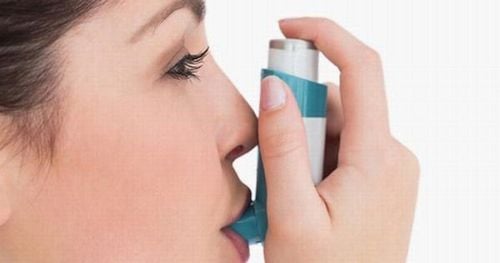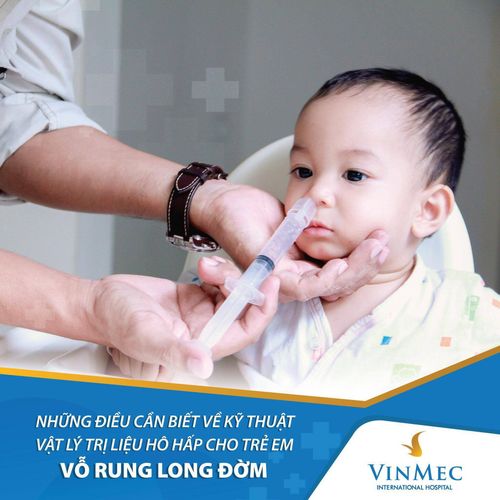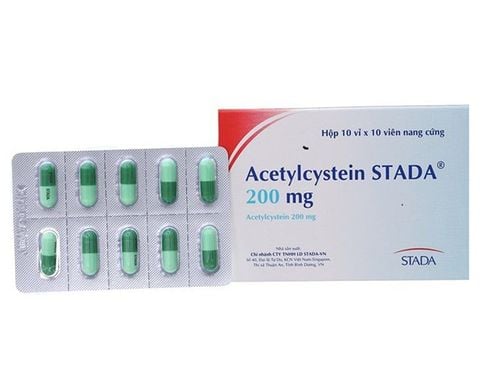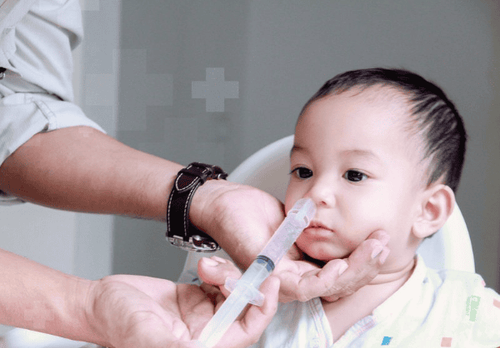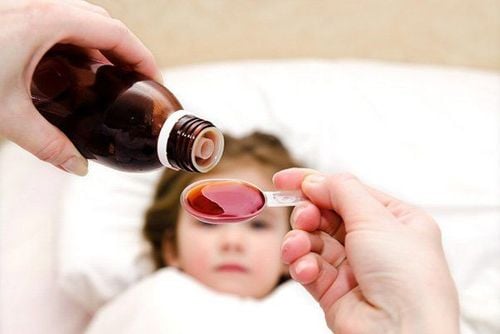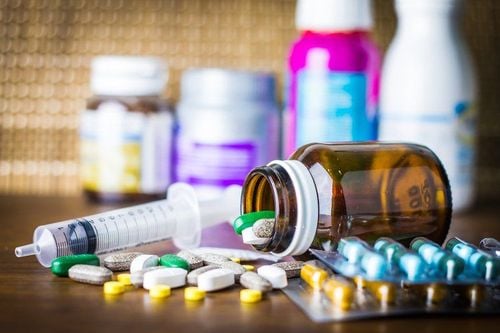This is an automatically translated article.
Respiratory physiotherapy for children is one of the methods applied to young pediatric patients, which has the effect of supporting non-drug treatment in order to relieve the condition of viscous sputum in the system. respiratory system in children.
1. What is Respiratory Physiotherapy?
Respiratory tract infection is a very common disease today, can be seen in all ages from children, adults and even the elderly. If this disease is not detected and treated early, it will leave many dangerous complications for the patient.
A patient encounters a respiratory infection, the respiratory organs such as the nose, pharynx, and throat will begin to secrete a lot of mucus, phlegm... and need to be eliminated from the body to prevent prevent stagnation of viscous sputum causing dangerous medical conditions such as airway obstruction, atelectasis ...
To effectively treat the above respiratory diseases, besides medical treatment, Respiratory physiotherapy is a very effective and widely used supportive treatment option today.
Respiratory physiotherapy can be done manually by a technician or with the help of some tools, or both can be applied. Respiratory physiotherapy helps to improve the expansion of the respiratory organs because through special techniques it will help get rid of dirt including mucus, phlegm... out of the respiratory tract. of the patient.
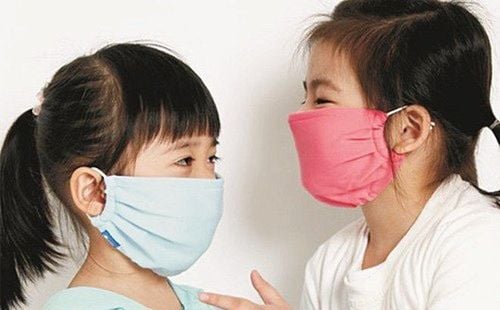
Nhiễm khuẩn đường hô hấp là một bệnh lý rất phổ biến hiện nay
2. Respiratory physiotherapy for children
Respiratory tract infections are especially dangerous for children because children's respiratory systems have not fully developed, the airways are still very narrow, children's noses are smaller than adults, so if sputum stasis will be much more dangerous. For newborns, special attention should be paid because the function of mouth breathing in newborns has not yet been formed, so if there is viscous sputum, the infant cannot breathe, a high risk of death.
Besides, for children who are older and have the ability to breathe through their mouth, respiratory infections exist as a dangerous problem that needs to be overcome as soon as possible, that is when breathing through the mouth. Because the oral mucosa cannot moisten and clean like the nasal system, children will face the risk of inhaling dirt and bacteria from the surrounding environment into the pharynx, then spreading to the lung area. and cause infection in children. The dangerous complications that can occur for respiratory infections in children are atelectasis, atelectasis due to sputum stasis, lung abscess ...
According to research, respiratory physiotherapy for Children are considered an effective treatment support method in these cases, helping to get rid of mucus very well and increase the ability to recover early for children, helping to improve respiratory function for children in the long term. earliest time. Some techniques performed in respiratory physiotherapy for children include:
Frequent nasal irrigation with physiological saline to expel mucus from the pharynx Perform back-slapping techniques, the technician helps Pediatric patients practice exhalation at a slow rate to drain the viscous sputum from the bronchioles to the great bronchi, creating force and speed to stimulate the patient to cough naturally as a good reflex to expel the mucus. to the pharynx and continue to apply physiological saline wash in the oropharynx to expel the viscous sputum from the body.
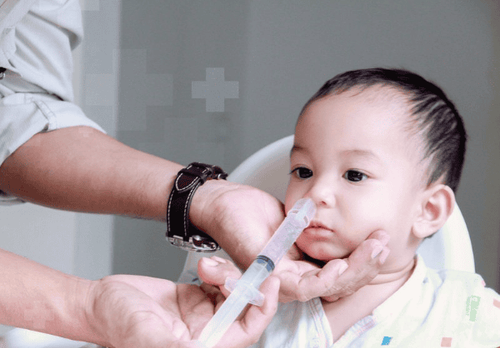
Rửa mũi thường xuyên bằng nước muối sinh lý nhằm tống xuất đàm nhớt vùng hầu họng
3. Should physical therapy be given to children with respiratory disease?
Diseases related to the respiratory tract are very diverse, so not all children with respiratory infections or problems affecting respiratory function can also perform respiratory physiotherapy properly. It's best to follow the instructions of the treating doctor. Respiratory physiotherapy for children is not a method of treating respiratory diseases according to the cause of the disease, but is only considered a supportive treatment method, so it cannot completely cure the diseases. Respiratory.
If the patient suffers from bronchiolitis and has complications of atelectasis, the method of respiratory physiotherapy is very effective, helping the patient quickly recover respiratory function faster than the patient. with the method of suctioning viscous sputum through the endoscope. In contrast, for patients with pneumonia but without complications of atelectasis, there is no need for respiratory physiotherapy.
Some notes when practicing respiratory physiotherapy for children are:
A child with asthma, if assigned to do respiratory physiotherapy, absolutely do not practice for the child during an asthma attack Because at this time, respiratory physiotherapy measures will be counterproductive and make it difficult for the patient to breathe, causing dangerous consequences for the child. Pediatric patients who undergo thoracic surgery will inevitably have a stagnation of viscous sputum that causes respiratory failure, so it is necessary to practice respiratory physiotherapy early for the child. When performing the technique of pumping saline into the child's nose, it will cause discomfort to the child and make the child cry a lot, this is a good reflex because it will help expel the viscous sputum out faster. Children need to fast before practicing respiratory physiotherapy for about 2 hours After finishing respiratory physiotherapy for children, parents need to pat the child, give him warm water and about 10 minutes. Only then can the baby be breastfed.
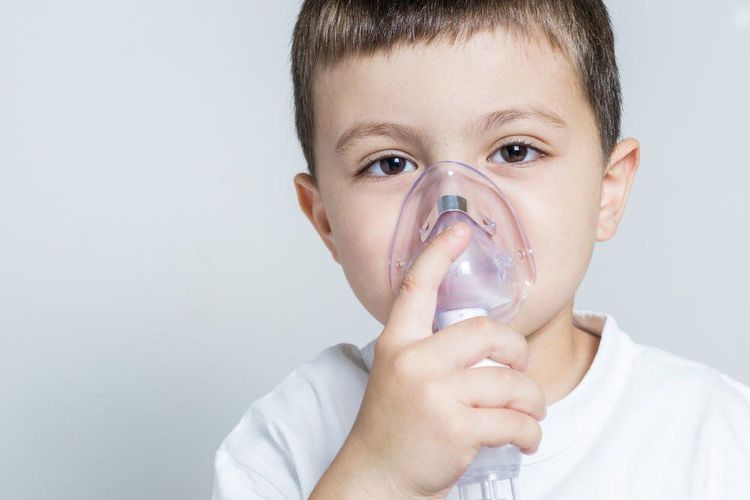
Một bệnh nhi bị hen suyễn thì nếu được chỉ định tập vật lý trị liệu hô hấp thì tuyệt đối không được tập cho trẻ trong lúc lên cơn hen
Respiratory physiotherapy for children should be performed as prescribed by the treating doctor and under the guidance and assistance of qualified respiratory physiotherapists, but parents should not Ideas for children to practice at home. Respiratory physiotherapy is only a measure to improve and support treatment, it cannot completely cure the disease, so the patient needs to be examined and found the cause of the disease so that there can be a treatment method. specific and effective.
Children in the period from 6 months to 3 years old are very susceptible to respiratory problems, skin diseases and gastrointestinal infections... parents need to pay special attention to the care and supply adequate nutrition for children. The pediatric department at Vinmec International General Hospital is the address for receiving and examining diseases that infants and young children are susceptible to: viral fever, bacterial fever, otitis media, pneumonia in children. With a system of facilities, modern medical equipment, sterile space, minimizing the impact as well as the risk of disease spread, Vinmec will bring satisfaction to customers. and is highly appreciated by industry experts with:
Gathering a team of leading pediatricians: including leading experts with high professional qualifications (professors, associate professors, doctors, Master's degree), experienced, worked at major hospitals such as Bach Mai, 108.. The doctors are all well-trained, professional, conscientious, knowledgeable about young psychology. Besides domestic pediatricians, the Department of Pediatrics also has the participation of foreign experts (Japan, Singapore, Australia, USA) who are always pioneers in applying the latest and most effective treatment regimens. . Comprehensive services: In the field of Pediatrics, Vinmec provides a series of continuous medical examination and treatment services from Newborn to Pediatric and Vaccine,... according to international standards to help parents take care of their baby's health from birth to childhood. Advanced techniques: Vinmec has successfully deployed many specialized techniques to make the treatment of difficult diseases in Pediatrics more effective: neurosurgery - skull surgery, stem cell transplantation blood in cancer treatment. Professional care: In addition to understanding children's psychology, Vinmec also pays special attention to the children's play space, helping them to play comfortably and get used to the hospital's environment, cooperate in treatment, improve the efficiency of medical treatment.
Please dial HOTLINE for more information or register for an appointment HERE. Download MyVinmec app to make appointments faster and to manage your bookings easily.
SEE MORE
Should parents perform sputum vibration at home for children? Guidelines for proper care of children with acute nasopharyngitis When do children with pneumonia need to be hospitalized?




